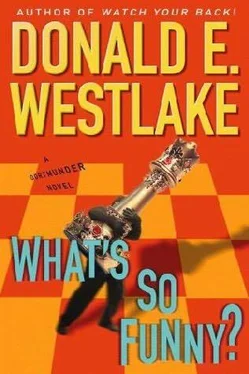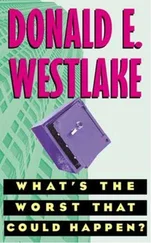"Well, you got some guys back there," Rollo told him. "The other bourbon's got your glass."
"Good. I didn't want to disturb you," he said, gesturing at the bottles along the backbar.
"You don't disturb me," Rollo said. "It's a place of business."
"Right."
Leaving Rollo and that conversation, Dortmunder walked down to the end of the bar and past the regulars, as the fourth one was saying, "You know what's a very good card game? Frisk."
"Frisk?"
Suddenly tentative again, the fourth regular said, "Isn't that it? Frisk? Like bridge."
Rounding the end of the bar, Dortmunder walked down the hall, past the doors labeled POINTERS and SETTERS with black dog silhouettes, and past the former phone booth, now an unoccupied sentry box containing nothing but notes to and from the lovelorn plus a few frayed wire ends, and into a small square room with a concrete floor. Beer and liquor cases were stacked against all the walls, floor to ceiling, leaving just space enough for a beat-up old round wooden table with a once-green felt top, this surrounded by half a dozen armless wooden chairs. The only light source was a single bare bulb under a round tin reflector hanging from a long black wire over the center of the table.
This was where they would meet, and it turned out, this time Dortmunder was the last to arrive, and as usual, the prize awarded to the last arrival was that he got to sit at the table with his back to the door. Andy Kelp had apparently been the first to show up, since he now sat in the place of utmost security on the opposite side of the table, facing the door. In front of him on the felt stood the bottle of alleged bourbon, plus two short fat glasses, one half full and one containing only ice cubes.
To Kelp's left sat Stan Murch, and to Stan's left Judson Blint, the kid. In front of each of them was a glass of draft beer and between them the saltshaker they shared, it being a tenet of Stan's creed that a little salt sprinkled into a glass of beer would restore a faltering head, a belief the kid had lately signed onto.
Across from those two, more or less taking up that opposite quadrant, was Tiny Bulcher, his fist closed around a glass that looked as though it might have cherry soda in it but which actually contained a mixture of vodka and less expensive Chianti, a drink Tiny claimed was not only robust but also good for the digestion. His digestion, anyway.
It was Tiny who'd been speaking when Dortmunder entered the room: "If that's his attitude, fine, I put him back in the meat locker."
People tended to look for a distraction when Tiny was telling his stories, so the room significantly brightened when everybody saw Dortmunder walk in. "There you are!" Kelp sang out.
"You got my glass," Dortmunder said, shut the door, and sat with his back to it, putting the envelope on the table in front of him.
"Coming up," Kelp said, and poured into the emptier glass at his disposal, then paused with the bottle hovering. "Good?"
"That's fine," Dortmunder agreed.
As the glass relayed from Kelp to Stan to the kid to Dortmunder, Kelp said, "We just been waiting for you to get here with the stuff."
"You tell them what I got?"
"No," Kelp said. "I thought you'd like that pleasure yourself."
"Thank you, Andy," Dortmunder said, took a sip of his drink, and nodded at the others. "I got it all here," he said, and patted the envelope.
Judson said, "Medical records?"
"That's just the cover story," Dortmunder told him. "Inside, it's a different story."
Kelp said, "He had an interesting night, John did."
"Andy and I," Dortmunder said, "we thought we'd check out the place where the chess set's gonna be when it's outa that damn vault, and the place is a private eye's office down in the West Village."
Judson said, "An office?"
"Well, he's got the whole building."
Stan said, "That's some private eye."
Dortmunder shrugged. "It's only a two-story building. Anyway, what with one thing and another, I'm on this roof I gotta get off, and down into this space behind all these buildings, and I thought the only way out was through this Perly's building."
Judson said, "Perly?"
"That's the guy's name. Jacques Perly."
"Very pretty," Tiny said, not as a compliment.
"Anyway," Dortmunder said, "Andy was out ahead of me, turned out he went a different way, through an apartment building I didn't notice."
Stan said, "An apartment building you didn't notice? How do you not notice an apartment building?"
Kelp, to offer some assistance, said, "It was nighttime, Stan, and it was very dark and confusing down in there."
"If you say so," Stan said.
Ignoring that, Dortmunder said, "So I went through Perly's building, without, I might say, leaving one single trace that I went through there. And while I was there, I figured, let's see what it looks like here. So I tossed it, and I found some stuff."
Stan said, "What stuff?"
"Well, their other garage door opener," Dortmunder told him. "I didn't bring that with me, I got it at home."
Stan said, "This is a place with a garage? In Manhattan?"
Kelp said, "You see them sometimes, Stan, with the sign. No Parking, Active Driveway ."
"It's an old industrial building," Dortmunder explained. "Converted for Perly."
Abruptly, Judson laughed. "You got their garage door opener! You could go there any time, bing-bing, you're in."
"It's loud," Dortmunder cautioned him. "You go in that way, you're not exactly sneaking up on anybody."
"Still," Judson said." It's nice."
Kelp said, "John, tell them what else you got."
"Well, Perly is a very organized guy," Dortmunder said, taking from Medical Records the sheets of paper covered with copies of Perly's neat small handwriting. "He put down the time the chess set's getting there, who's moving it, the security people they're gonna have then and later, the extra security stuff they're gonna lay on like motion sensors—"
"I hate motion sensors," Tiny said.
"We all do, Tiny," Dortmunder agreed. "Anyway, I made copies, so we can know what he knows."
Tiny said, "How many copies?"
"Just one, Tiny. I didn't wanna hang out there too long."
"Well, I don't wanna hang out here too long," Tiny said. "Kid, read it."
So for the next five minutes Judson read Perly's careful notes, while the others listened in a silence that moved steadily toward awe. When he finished, the silence went on for another few seconds, until Kelp said, "They really don't want us in there."
"Not up to them," Tiny said.
"Well, let's do a little recap here," Stan said. "I think I got it, but tell me if I'm right. This guy Perly gets to his office at ten tomorrow night." He looked at Judson. "Right?"
"That's what it says," Judson agreed.
Stan nodded. "He's got stuff to do, get ready for his house-guests. And they're gonna show up at eleven. Am I still right?"
"Absolutely," Judson told him. "These are the security guys and the tech guys with the equipment."
"And with them," Stan said, "they got Tiny's motion sensors."
"I don't like motion sensors," Tiny said.
"We know, Tiny," Stan told him. He looked around. "They also got — what? New phones."
"A cell phone," Kelp said. "And a special landline phone doesn't use Perly's connections."
"They've also got," Dortmunder said, "a metal cabinet with thirty-two lockable drawers for the chess pieces."
"And the complete security thing at the office door like at the airport with the doorway you go through," Stan said. He looked around. "Am I leaving anything out?"
"The moat," Kelp suggested.
Stan frowned at him. "The what?"
"Forget it," Kelp said.
"You can't do a moat in the city," Stan told him.
"I understand that. Just forget it. Go on with the recap. Now they're setting up all this stuff."
Читать дальше












